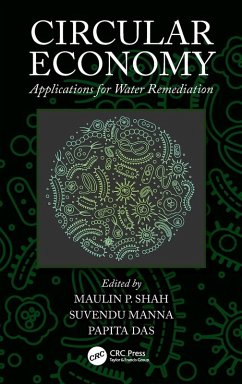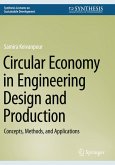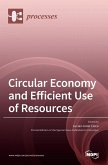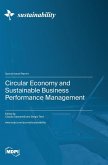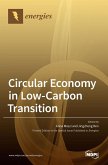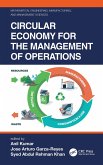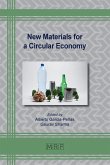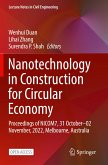Circular Economy
Applications for Water Remediation
Herausgeber: Shah, Maulin P.; Das, Papita; Manna, Suvendu
Circular Economy
Applications for Water Remediation
Herausgeber: Shah, Maulin P.; Das, Papita; Manna, Suvendu
- Gebundenes Buch
- Merkliste
- Auf die Merkliste
- Bewerten Bewerten
- Teilen
- Produkt teilen
- Produkterinnerung
- Produkterinnerung
Circular Economy: Applications for Water Remediation will examine the current understanding on the circular economy in water remediation processes, its drawbacks, and relatively unexplored areas that require further research.
Andere Kunden interessierten sich auch für
![Circular Economy in Engineering Design and Production Circular Economy in Engineering Design and Production]() Samira KeivanpourCircular Economy in Engineering Design and Production30,99 €
Samira KeivanpourCircular Economy in Engineering Design and Production30,99 €![Circular Economy and Efficient Use of Resources Circular Economy and Efficient Use of Resources]() Circular Economy and Efficient Use of Resources51,99 €
Circular Economy and Efficient Use of Resources51,99 €![Circular Economy and Sustainable Business Performance Management Circular Economy and Sustainable Business Performance Management]() Circular Economy and Sustainable Business Performance Management115,99 €
Circular Economy and Sustainable Business Performance Management115,99 €![Circular Economy in Low-Carbon Transition Circular Economy in Low-Carbon Transition]() Circular Economy in Low-Carbon Transition53,99 €
Circular Economy in Low-Carbon Transition53,99 €![Circular Economy for the Management of Operations Circular Economy for the Management of Operations]() Circular Economy for the Management of Operations155,99 €
Circular Economy for the Management of Operations155,99 €![New Materials for a Circular Economy New Materials for a Circular Economy]() New Materials for a Circular Economy123,99 €
New Materials for a Circular Economy123,99 €![Nanotechnology in Construction for Circular Economy Nanotechnology in Construction for Circular Economy]() Nanotechnology in Construction for Circular Economy30,99 €
Nanotechnology in Construction for Circular Economy30,99 €-
-
-
Circular Economy: Applications for Water Remediation will examine the current understanding on the circular economy in water remediation processes, its drawbacks, and relatively unexplored areas that require further research.
Hinweis: Dieser Artikel kann nur an eine deutsche Lieferadresse ausgeliefert werden.
Hinweis: Dieser Artikel kann nur an eine deutsche Lieferadresse ausgeliefert werden.
Produktdetails
- Produktdetails
- Verlag: CRC Press
- Seitenzahl: 388
- Erscheinungstermin: 23. August 2024
- Englisch
- Abmessung: 240mm x 161mm x 25mm
- Gewicht: 746g
- ISBN-13: 9781032559087
- ISBN-10: 103255908X
- Artikelnr.: 70149663
- Herstellerkennzeichnung
- Libri GmbH
- Europaallee 1
- 36244 Bad Hersfeld
- gpsr@libri.de
- Verlag: CRC Press
- Seitenzahl: 388
- Erscheinungstermin: 23. August 2024
- Englisch
- Abmessung: 240mm x 161mm x 25mm
- Gewicht: 746g
- ISBN-13: 9781032559087
- ISBN-10: 103255908X
- Artikelnr.: 70149663
- Herstellerkennzeichnung
- Libri GmbH
- Europaallee 1
- 36244 Bad Hersfeld
- gpsr@libri.de
Maulin P. Shah has been an active researcher and scientific writer in his field for over 20 years. He received his BSc (1999) in Microbiology from Gujarat University, Godhra, Gujarat, India. He also earned his PhD (2005) in Environmental Microbiology from Sardar Patel University, Vallabh Vidyanagar, Gujarat, India. His research interests include biological wastewater treatment, environmental microbiology, biodegradation, bioremediation, and phytoremediation of environmental pollutants from industrial wastewaters. He has published more than 350 research papers in national and international journals of repute on various aspects of microbial biodegradation and the bioremediation of environmental pollutants. He is the editor of 150 books of international repute. He has edited 25 special issues specifically on industrial wastewater research, microbial remediation, and biorefinery of wastewater treatment area. He is associated as an Editorial Board Member for 25 highly reputed journals. Suvendu Manna received his PhD in Materials Science in 2015. Currently, he is an assistant professor at the University of Petroleum and Energy Studies, Dehradun, India. He has authored or co-authored close to 45 international research and review articles in SCI- and Scopus-indexed journals. In addition, he has written some 21 book chapters and edited four books. His current research interests include nanomaterials for waste management, waste recycling, environmental microbiology, and water treatment. Papita Das received her BTech in Chemical Engineering from the University of Calcutta, India, and ME PhD in Chemical Engineering from Jadavpur University, India. She is a professor in the Department of Chemical Engineering and Director, School of Advanced Studies in Industrial Pollution Control Engineering, Jadavpur University, India. She is known for her work in water treatment using different novel adsorbent materials. She also works on biomass-based energy production and the synthesis and degradation of polymeric-nanocomposites. She has published more than 175 international journal research articles and reviews and more than 40 book chapters in various SCI- and Scopus-indexed journals. She was also ranked among the top 2% of scientists (2020, 2021, and 2022) in the World Rankings published by Stanford University, representing the top 2% most-cited scientists in various disciplines. In the field of chemical engineering, in 2021, she was ranked 432 among 53,348 researchers based on career-long impact and 171 among single-year citations, and, in 2020, she was ranked 614 among 55,697 researchers based on career-long impact and 217 for single-year citations. She has also supervised ten (completed), two (submitted), and seven PhD students (ongoing). She has been the editor of two books, published by Elsevier and Springer, and she is an editorial board member, editor-in-chief, and associate editor of various international journals. She has completed 17 projects funded by government agencies and industry.
Chapter 1 Integrating the Circular Economy and a Sustainability Strategy in
Water Remediation Applications; Chapter 2 Circular Economy in Developing
Countries: Present Status, Pathways, Benefits, and Challenges; Chapter 3
Water Contamination and the Circular Economy; Chapter 4 Nitrate and
Phosphorus Removal from Industrial and Domestic Wastewater Using
Agricultural Biomass and Agro-industrial Waste Composites; Chapter 5 Urban
Sludge Management and Circular Transformation in Water Remediation;
Chapter 6 Unveiling the Ecological Footprint of Pharmaceuticals and
Personal Care Products (PPCPs) as Emerging Contaminants and Management
Strategies; Chapter 6 Unveiling the Ecological Footprint of Pharmaceuticals
and Personal Care Products (PPCPs) as Emerging Contaminants and Management
Strategies; Chapter 8 Rainwater Harvesting and its Application to Water
Resources; Chapter 9 Circular Economy in Urban Wastewater Management: A
Concise Review; Chapter 10 Circular Economy to Transfer Urban Water;
Chapter 11 Circular Economy on Utilization of Wastewater for Energy
Recovery; Chapter 12 Circular Economy on Resource Recovery from Industrial
Wastewater; Chapter 13 Nanomaterials from Waste and their Application for
Wastewater Treatment; Chapter 14 Natural Adsorbents for Effective Treatment
of Dye Wastewater from Textile Industries: A Comprehensive Review; Chapter
15 Circular Economy on Biogas Production from Wastewater; Chapter 16
Sustainable Valorization of Lignocellulose-based Green Biomass
Bio-adsorbents for Toxic Pollutant Removal Using Wastewater Treatments;
Chapter 17 Carbon Nanotube Membranes from Waste Materials for Water
Treatment: Trash to Treasure; Chapter 18 Circular Economy on Biogas
Production from Wastewater; Chapter 19 Potential Effects and Removal
Strategies for Contaminants of Emerging Concern (CECs) in the Circular
Economy of Water
Water Remediation Applications; Chapter 2 Circular Economy in Developing
Countries: Present Status, Pathways, Benefits, and Challenges; Chapter 3
Water Contamination and the Circular Economy; Chapter 4 Nitrate and
Phosphorus Removal from Industrial and Domestic Wastewater Using
Agricultural Biomass and Agro-industrial Waste Composites; Chapter 5 Urban
Sludge Management and Circular Transformation in Water Remediation;
Chapter 6 Unveiling the Ecological Footprint of Pharmaceuticals and
Personal Care Products (PPCPs) as Emerging Contaminants and Management
Strategies; Chapter 6 Unveiling the Ecological Footprint of Pharmaceuticals
and Personal Care Products (PPCPs) as Emerging Contaminants and Management
Strategies; Chapter 8 Rainwater Harvesting and its Application to Water
Resources; Chapter 9 Circular Economy in Urban Wastewater Management: A
Concise Review; Chapter 10 Circular Economy to Transfer Urban Water;
Chapter 11 Circular Economy on Utilization of Wastewater for Energy
Recovery; Chapter 12 Circular Economy on Resource Recovery from Industrial
Wastewater; Chapter 13 Nanomaterials from Waste and their Application for
Wastewater Treatment; Chapter 14 Natural Adsorbents for Effective Treatment
of Dye Wastewater from Textile Industries: A Comprehensive Review; Chapter
15 Circular Economy on Biogas Production from Wastewater; Chapter 16
Sustainable Valorization of Lignocellulose-based Green Biomass
Bio-adsorbents for Toxic Pollutant Removal Using Wastewater Treatments;
Chapter 17 Carbon Nanotube Membranes from Waste Materials for Water
Treatment: Trash to Treasure; Chapter 18 Circular Economy on Biogas
Production from Wastewater; Chapter 19 Potential Effects and Removal
Strategies for Contaminants of Emerging Concern (CECs) in the Circular
Economy of Water
Chapter 1 Integrating the Circular Economy and a Sustainability Strategy in
Water Remediation Applications; Chapter 2 Circular Economy in Developing
Countries: Present Status, Pathways, Benefits, and Challenges; Chapter 3
Water Contamination and the Circular Economy; Chapter 4 Nitrate and
Phosphorus Removal from Industrial and Domestic Wastewater Using
Agricultural Biomass and Agro-industrial Waste Composites; Chapter 5 Urban
Sludge Management and Circular Transformation in Water Remediation;
Chapter 6 Unveiling the Ecological Footprint of Pharmaceuticals and
Personal Care Products (PPCPs) as Emerging Contaminants and Management
Strategies; Chapter 6 Unveiling the Ecological Footprint of Pharmaceuticals
and Personal Care Products (PPCPs) as Emerging Contaminants and Management
Strategies; Chapter 8 Rainwater Harvesting and its Application to Water
Resources; Chapter 9 Circular Economy in Urban Wastewater Management: A
Concise Review; Chapter 10 Circular Economy to Transfer Urban Water;
Chapter 11 Circular Economy on Utilization of Wastewater for Energy
Recovery; Chapter 12 Circular Economy on Resource Recovery from Industrial
Wastewater; Chapter 13 Nanomaterials from Waste and their Application for
Wastewater Treatment; Chapter 14 Natural Adsorbents for Effective Treatment
of Dye Wastewater from Textile Industries: A Comprehensive Review; Chapter
15 Circular Economy on Biogas Production from Wastewater; Chapter 16
Sustainable Valorization of Lignocellulose-based Green Biomass
Bio-adsorbents for Toxic Pollutant Removal Using Wastewater Treatments;
Chapter 17 Carbon Nanotube Membranes from Waste Materials for Water
Treatment: Trash to Treasure; Chapter 18 Circular Economy on Biogas
Production from Wastewater; Chapter 19 Potential Effects and Removal
Strategies for Contaminants of Emerging Concern (CECs) in the Circular
Economy of Water
Water Remediation Applications; Chapter 2 Circular Economy in Developing
Countries: Present Status, Pathways, Benefits, and Challenges; Chapter 3
Water Contamination and the Circular Economy; Chapter 4 Nitrate and
Phosphorus Removal from Industrial and Domestic Wastewater Using
Agricultural Biomass and Agro-industrial Waste Composites; Chapter 5 Urban
Sludge Management and Circular Transformation in Water Remediation;
Chapter 6 Unveiling the Ecological Footprint of Pharmaceuticals and
Personal Care Products (PPCPs) as Emerging Contaminants and Management
Strategies; Chapter 6 Unveiling the Ecological Footprint of Pharmaceuticals
and Personal Care Products (PPCPs) as Emerging Contaminants and Management
Strategies; Chapter 8 Rainwater Harvesting and its Application to Water
Resources; Chapter 9 Circular Economy in Urban Wastewater Management: A
Concise Review; Chapter 10 Circular Economy to Transfer Urban Water;
Chapter 11 Circular Economy on Utilization of Wastewater for Energy
Recovery; Chapter 12 Circular Economy on Resource Recovery from Industrial
Wastewater; Chapter 13 Nanomaterials from Waste and their Application for
Wastewater Treatment; Chapter 14 Natural Adsorbents for Effective Treatment
of Dye Wastewater from Textile Industries: A Comprehensive Review; Chapter
15 Circular Economy on Biogas Production from Wastewater; Chapter 16
Sustainable Valorization of Lignocellulose-based Green Biomass
Bio-adsorbents for Toxic Pollutant Removal Using Wastewater Treatments;
Chapter 17 Carbon Nanotube Membranes from Waste Materials for Water
Treatment: Trash to Treasure; Chapter 18 Circular Economy on Biogas
Production from Wastewater; Chapter 19 Potential Effects and Removal
Strategies for Contaminants of Emerging Concern (CECs) in the Circular
Economy of Water

